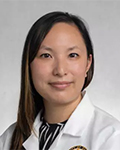Q&A: Julie Le, M.D.

Our March Q&A features Julie Le, M.D., a board-certified surgeon who specializes in the treatment of benign, high-risk and malignant breast pathologies. Born and raised in the City Heights area of San Diego, Dr. Le felt a calling to treat and serve the San Diego community, where she performs image-guided lumpectomies, nipple and skin-sparing mastectomies, flat aesthetic closures and axillary surgery. Dr. Le has been involved in medical and scientific research for more than 10 years and has co-authored multiple peer-reviewed articles that have been published in journals, including Annals of Surgical Oncology, Journal of Safety Research, and others. She has a special research interest in axillary management and high-risk breast lesions.
She completed a fellowship in breast surgical oncology at UC Los Angeles and a surgical residency at Spectrum Health in Grand Rapids, Mich. Dr. Le earned her medical degree from Oakland University William Beaumont School of Medicine in Rochester, Mich. She is a member of American Society of Breast Surgeons, Society of Surgical Oncology, American College of Surgeons and American Medical Women's Association.
In her spare time, Dr. Le enjoys baking goodies from the "British Bake Off" television show with her nieces and nephews. She loves listening to mystery podcasts and getting lost in fun, intriguing fiction and historical nonfiction novels.
Q: You have a special interest in the social impact of breast cancer treatment on young women including fertility, family planning and breast sexual health. What is something you wish more people knew about this area of specialty?
A: As more young women are diagnosed with breast cancer, I hope that cancer doctors (regardless of which aspect we treat) are or become comfortable with discussing how cancer treatment can alter the ability for future pregnancy and impact on sexual health including effects on partner intimacy (particularly the potential side effects of endocrine treatment). Areas that I think cancer doctors should address with our young patients include consideration of egg preservation prior to treatment, the balance of endocrine interruption for conception and cancer treatment (and what is deemed safe interruption) and how side effects of adjuvant therapy can cause dyspareunia or low libido. Many of the young patients are rightly focused on initiating cancer treatment as quickly as possible but it is also our job as cancer experts to address the other long-lasting effects that treatment may have on other aspects of their lives.
Q: You were born and raised in the City Heights area of San Diego and have returned to your hometown, where you serve your community. What does this familiarity lend to your practice, and how is it an asset?
A: I am incredibly fortunate that I have the unique experience of growing up with the very diverse and heterogeneous population that makes up San Diego. The biggest asset of being able to serve my community is building that connection with patients from all backgrounds who feel akin to a homegrown physician, exercising my limited but growing Spanish and Vietnamese tongue and proudly giving back to the community that has shaped me into the doctor that I am today.
Q: You have a special research interest in axillary management and high-risk breast lesions. What led you to pursue this field of study and what excites you about it going forward?
A: One of the things that excites me the most about breast cancer is the constant evolution in treatment particularly with safe de-escalation of care. My familial experience with lymphedema empowered me to have a particular interest in axillary management and it's exciting to see that we may safely omit lymph node surgery in certain low risk patients with no difference in survival and are reconsidering which high risk lesions truly need surgical removal. I am excited to see how axillary surgery will change for limited residual disease following neoadjuvant chemotherapy.
Q: What changes do you see coming in breast surgery over the next 10-20 years?
A: I think we are going to see a major decline in the need for axillary lymph node dissection as new information comes out about the efficacy of local control of axillary disease with radiation in setting of patients with positive lymph nodes following neoadjuvant chemotherapy and new agents that can more effectively treat locally advanced hormone positive breast cancer.
Q: What is something that keeps you motivated on tough days?
A: I am thankful that I have my sassy husband, clumsy but energetic puppy golden retriever and large loud family to keep me grounded on tough days.
